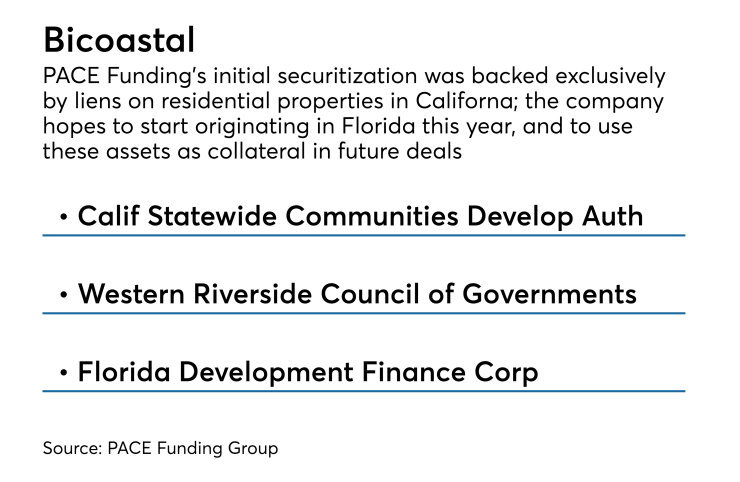With new financing in place, PACE Funding Group is gearing up to complete a second securitization by the end of the year.
Last week, the provider of Property Assessed Clean Energy financing announced it had obtained a $55 million warehouse line of credit from SunTrust Bank and Rosemawr Management. The facility will be used to support growth in California, where PACE Funding has been operating since 2014, and in Florida, where the company hopes to begin operating later this year. It can be upsized to $100 million.
James Vergara, managing director of capital markets, expects to be ready to tap the securitization market again later this year. This second deal will likely be privately placed, similar to a $50 million deal completed via Natixis in March, but will be larger.
Then, “maybe sometime next year we can do something more on the run, a 144a-type deal,” Vergara said in a telephone interview.
When PACE Financing came to the securitization market in March, it had to repurchase assets it had sold to an investor on a forward flow basis to help collateralize the deal; the company only originated $25 million of PACE financing for all of 2017.
“Volume has picked up this year — in a good way,” he said.
The pickup in origination volume follows a change in PACE Financing’s business model. Originally the company, which is based in Los Gatos, California, partnered with bigger lenders, particularly solar providers or home improvement financing firms, piggybacking on their salespeople and networks of contractors to generate origination volume.
“Frankly, it didn’t work out,” he said.

The problem? Financing for energy and water efficiency upgrades is originated by contractors, typically on-site when they do an estimate. But PACE, which is repaid using a lien on a property that is repaid through a municipal tax bill, takes time to explain to consumers. After spending a couple of hours at the kitchen table, many contractors with several financing options were less inclined to take the extra time to go over it.
By mid-2016, PACE Lending realized it needed an in-house sales force and its own network of contractors, Vergara said. This boosted origination, though the company still only underwrote a few million dollars of PACE financing in the last few months of that year.
At that time, PACE Financing’s primary funding came from selling assets on a forward flow basis; it would originate at par and sell at a premium. In 2017, the company switched to another capital provider that gave it a little better pricing on premiums. Vergara, who has over 16 years of municipal finance and fixed income experience at Morgan Stanley, Lehman Brothers and Deutsche Bank, joined PACE Financing in June of that year, and he engineering a change in funding strategy. The company warehoused its first securitization using a smaller line of credit provided by Rosemawr alone.
This year, Vergara said, PACE Funding has been focused on processes. Its staff has doubled since the beginning of the year and now stands at about 40. "We had to add sales and support staff to manage our current production levels,” he said. There are people who can review applications and make sure contractors are up to date on underwriting practices and have the latest app on their phone. “We try to run a tight ship from a contractor standpoint,” he said. “We have a small network, compared to our competitors.”
Vergara wouldn’t rule out returning to PACE Funding’s original business model of partnering with other lenders to gain operational leverage, however. “It may work in the future,” he said.
In California, PACE Funding works with two municipal authorities, the California Statewide Communities Development Authority and the Western Riverside Council of Governments. In Florida it works with the Florida Development Finance Corp.



